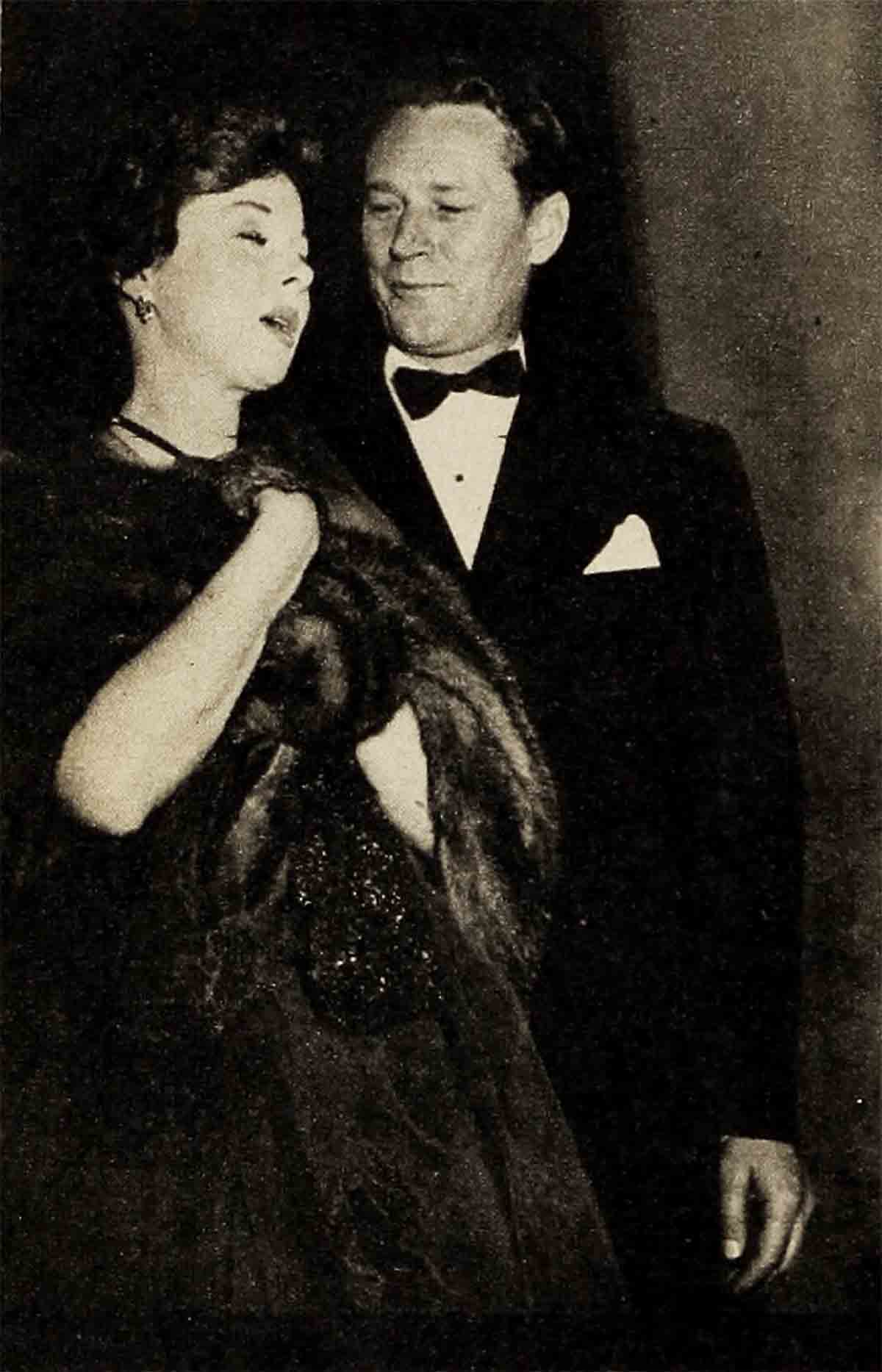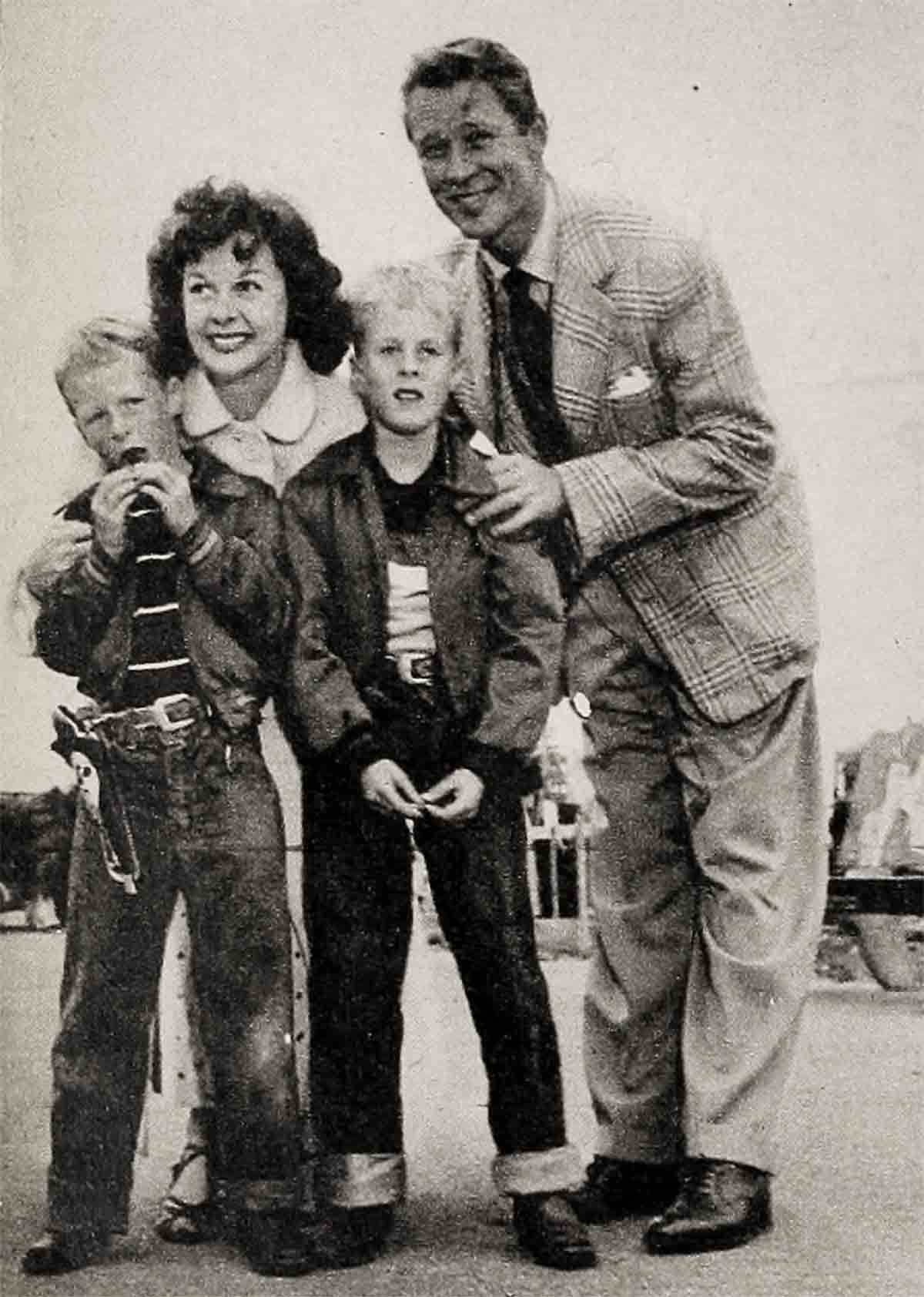
Still Slugging—Susan Hayward
All married couples fight. Some verbally, some physically, some in subtler ways.
In the last ten years Susan Hayward and Jess Barker have tried them all, apparently. Some of these fights have resulted in temporary separations followed by loving reconciliations.
A few months ago, just after Susan had finished Demetrius And The Gladiators at $5,000 a week, she and Jess were sitting in the livingroom of their Longridge Road home.
The atmosphere was frigid. Whatever love they had once had for each other had now turned into a battle of the sexes. The only bond which held their marriage together was the twins, Timothy and Gregory, who will be nine years old this month.
Susan Hayward, as Hollywood knows, is an iron-willed, tenacious young woman of thirty-six, who has long been suggesting that her husband give up his not-too-successful acting career.
For years she has been advising Jess to “get into something else.”
Jess has demurred.
“After all,” one of his friends explains, “How could he possibly take a job in a filling station? People would drive up and say, ‘See that guy over there? He’s Susan Hayward’s husband.’ ”
On this particular night, Susan again brought up the unpleasant subject of Jess and a new job. According to intimates, she salted her conversation with one or two aspersions on her husband’s manhood.
Provoked, Jess slapped the beautiful redhead. She bit his hand. He cuffed her again. “He has slapped me many times,” Susan said later, “but this time I could tell it was going to be worse, his face was so distorted with rage—”
Susan began to scream. Jess, according to her version, came after her again. She tried to get away but he caught her outside at the edge of the swimming pool and lashed out with a short left jab to the cheek.
Her screams of “No, Jess, no!” and “Somebody, please help me!” aroused the neighborhood. The neighbors called the police. By the time they arrived, Susan’s eye had begun to turn black and blue. She looked like a battered passenger emerging from a wrecked car.
Now there are some wives who don’t mind an occasional beating. They absorb the punishment as a manifestation of their husband’s love. Susan is not this type.
She called her lawyer, Martin Gang.
“This is the end,” she wailed, “the end, Martin. He almost killed me. I want you to file for a divorce as soon as possible.”
Like all good lawyers, Martin Gang tried to discourage a divorce. Before this, he had recommended that the Barkers consult Dr. Maurice Karpf, a marriage counselor in Beverly Hills.
Susan and Jess had gone to see Dr. Karpf rather regularly. Their problem was a simple one; for Hollywood, an ordinary one. The wife was the breadwinner, and an uncommonly successful one. She was earning $250,000 a year while her husband was earning $500.
This situation would hurt any man’s vanity. Jess’ ego was suffering badly. While Susan was at work in the studio, he was staying at home and taking care of the children.
In short, their marital positions were reversed. Jess was playing the mother and housekeeper and Susan was playing the dominant wage-earner.
The solution, of course, was for Jess to take any kind of a job that would restore his self-respect and Susan’s.

But that brings up the other problem of pride. When Susan and Jess were married they were equally successful movie actors. Although Susan has far outstripped him, professionally, Jess is still an actor.
At thirty-nine, he thinks he is too old to canvass. new employment fields. He has no second profession and of course he would have a difficult time finding a job in a field in which he has no training.
Gradually, he began missing his appointments with Dr. Karpf. Then came the fist fight with Susan.
In living with Jess Barker for almost ten years, Susan Hayward was deceiving herself. She must have known that she didn’t love her slender, handsome husband.
Susan might have divorced Barker after a short marriage, but the twins came along in the first year and she decided to make the best of what she already considered a mistake. She hoped that things would improve. Instead they got worse.
By 1947 she had decided that life with Jess was impossible. She went to see her attorney, then Kenneth Chantry, and divorce papers were filed. Chantry suggested that Jess and Susan talk things over with Dr. Paul Popenoe, the Institute of Marital Relations counselor.
This advice prevented.a divorce but never reached the heart of the Barkers’ marital problem, possibly because Susan failed to tell the whole story of their marriage.
Anyway, as Susan’s marriage disintegrated, her career reached new heights. In 1947 she was nominated for an Academy Award on the basis of her performance as an alcoholic in Smashup. She has always been single-minded about her career and as she achieved more and more prominence, she didn’t have much time to worry about her domestic difficulties.
Once those difficulties deteriorated into fist fights, Susan decided that she could not stay with her husband any longer. She filed for divorce, claiming that there was no community property and that Jess was entitled only to visitation rights.
Jess’ lawyer, Sam Hahn, countered, “My client is not interested in a divorce. He is thinking of his children. He wants to preserve his marriage. Miss Hayward has no cause for divorce. We want this case to be heard by the conciliation commissioner.”
You all know what happened then. Susan agreed to go to the Conciliation Court with Barker but she was adamant about giving up any idea of divorce.
“I just want to be free of him,” she said. “There is absolutely no chance of reconciliation. I simply do not love him.”

She asked the court for an order forbidding Jess to go near her property or bother her. She also agreed that he might have the two boys every weekend.
After putting her mother in charge of the twins and the house, she few down to Mexico to star in Garden Of Evil.
A few days later, in violation of the court’s restraining order, Jess Barker moved back into the house.
According to Mrs. Cleo Miller, the housekeeper, Barker said, “I’m back and I want you to start cooking for me as well as for the boys. Do you understand that?” He demanded to see his sons.
“It’s past their bedtime,” Cleo told Barker.
“Don’t you worry about that,” the actor allegedly announced. “I’m the boss.”
Barker picked his boys up at the Buckley School one afternoon and didn’t bring them home that night. Aggravated and agitated, Mrs. Marrener, Susan’s mother, called the lawyers.
Immediately, they filed a show cause order asking that Barker be cited for contempt of court and punished for violating the previous restraining order. It looked as though Jess Barker might go to jail.
Jess explained his violation of the restraining order. “I returned home because I learned that my son Timothy was sick. When I dropped by to see how he was feeling, I found that the person left in charge of the house was not in and the children were not under proper supervision.
“My wife’s mother wasn’t on the premises when I arrived and she hadn’t been at the house for two days.
“I am as fully concerned about my children as any normal and right-thinking parent would be. And I think any parent has a perfect right to be with his children—especially since the other parent is in a foreign country.”
Susan was in Mexico unaware of the goings on at home. Her mother and her housekeeper were ordered to appear at the California Superior Court in Burbank for a new battle against Jess Barker.
When Barker, nattily dressed in a brown glen plaid suit, yellow shirt and brown tie and carrying a thick red-bound law book under his arm, showed up in the court lobby with his lawyer, Susan’s lawyer engaged them in out-of-court conversation.
“Now, look,” he said, addressing himself to Barker’s counsel, “you promised the last time that your client would not occupy Miss Hayward’s premises. You said he’d stay away. As soon as my client left town, Mr. Barker was back.

“We don’t want to get tough, Sam. We don’t want to ask the judge to throw Mr. Barker in the jug, but please understand this, Miss Hayward is afraid of her husband. She’s afraid that he’s going to beat her up. That’s why we got a restraining order. We don’t want him around.”
“We understand that very well,” Sam Hahn said. “But there are extenuating circumstances in this case. My client learned that his son was sick. This was an emergency. As an emergency move he went back into the house. He wanted to make sure that his son was taken care of.
“The mother-in-law was supposed to look after the boys. But where was the mother-in-law? Don’t forget that Miss Hayward is in Mexico and that these boys are entitled to some parental love and attention.”
Susan’s lawyer said he realized all that but Barker had been granted visitation rights. Moreover he had the boys every weekend and could take them wherever he liked in California.
“I know,” he went on, “that Mr. Barker hasn’t been getting on with his mother-in-law, but I don’t want to get into that angle of the case. All I can say is that she was in the house when he was there. Mr. Barker wouldn’t even let the boys talk to their grandmother. All he would let them say was “Goodnight, Grandma, and then they were shooed off to bed.
“I’ll tell you what, Sam. We are willing to drop contempt proceedings against Mr. Barker this time, but I’m going to ask for a new restraining order keeping him away from the property and making it mandatory that he obey the temporary custody agreement. We’ll drop contempt proceedings, providing you agree as his agent to accept subpoena for any of his violations.”
“It’s a deal,” Sam Hahn said. And then the principals in the case filed into the court room.
Susan’s mother, Mrs. Kate Marrener, sat in the front row.
“I just wish,” she muttered to a reporter, “that they’d give me a chance to testify. Boy, I could tell them some things. Tried to kill her. Yes, kill her. That’s what he did.”
“Really wasn’t that bad,” a reporter said, “was it?”
“Just shows what you know, young man,’ Mrs. Marrener sniffed. “Fell into a tub of butter. That’s what he did. Never had it so easy in his life. My girl going to work every day while he hung around the house. Unnatural, that’s what it was. And those poor little boys. All mixed up. The Lord knows what ideas he puts into their head.
“He’s spent so much time with the boys. He’s been mother and father to them. Of course they love him. I came home. The boys were gone. Didn’t know where he’d taken them. He’d picked them up at school. I was worried sick. I called the lawyers right away.
“I hope my daughter doesn’t hear of this. Think she’d hear down there in Mexico? My poor girl. What a life she’s had! Lord knows how long this has been going on, his beating her. Too proud. Too much pride. That’s the trouble with her. Tried to keep everything to herself. Should’ve left him years ago, years ago.”
Roy L. Herndon, the presiding judge, entered the courtroom and looked at the calendar. The case of “Barker versus Barker” was called.
Both attorneys stood up and asked the judge for a private conference in his chambers. Jess Barker went with them. After fifteen minutes, they returned to the courtroom.
Barker was given a seat at a desk next to the judge and told to listen carefully.
“Your Honor,” began Milton A. Rudin, speaking on behalf of Susan Hayward, “we are prepared to drop contempt proceedings against Mr. Barker at this time, pending two stipulations. We want him to stay away from the premises at all times except when he is calling for his two sons.
“We have agreed, Your Honor, that Mr. Barker is entitled to have custody of his boys from Saturday at ten A.M. until Sunday at six P.M. until such time as a definite custody ruling is made.
“With reference to the Christmas holidays, we agree that Mr. Barker is entitled to pick up the children when the holiday commences on December 18. He is to keep them until ten A.M. Christmas Day. Their mother is flying up from Mexico where she is currently employed on a picture, especially to spend Christmas Day with them. She is to have them until December 27, after which Mr. Barker is to pick them up again and return them when school begins, which I believe is January 4, Your Honor.”
The judge turned toward Barker.
“You understand you are restrained and enjoined from occupying the premises?”
“Yes, Your Honor, but I’ve got. clothes there. I’d like permission to go back there and get them.”
At this moment, Mrs. Marrener jumped up and whispered something to Rudin.
“I’ve been told, Your Honor,” Rudin interrupted, “that Mr. Barker’s clothes are no longer at the residence. They’ve been packed and moved to Bekin’s Warehouse.”
In a second, Barker’s little lawyer, Sammy Hahn, was on his feet.
“See, Your Honor,” he shouted. “It’s the mother-in-law’s fault. Right away as soon as my client’s back is turned—gone! The clothes are gone. This is pretty unfair, Your Honor. My client is a professional man, needs his clothes. She has no right to move them out. A man’s house is his castle. My client is a professional. You see what I mean, Your Honor? This trouble with relatives. Right away the mother-in-law. Who asked her to send his clothes out?”
Opposing counsel grew angry. “Your Honor,” he said, “we’re not arguing a custody case here. Neither is Miss Hayward’s mother on trial. We entered into an agreement with Mr. Hahn to drop contempt proceedings against his client who was definitely violating an existing restraining order. Now, all of a sudden he wants to try my client’s mother.”
The judge agreed with Susan Hayward’s lawyer. “Eventually,” he said, “the conduct of relatives will be considered by the court in granting custody of the children. But right now, Mr. Barker, I want to impress upon you the importance of giving complete obedience to the pending court order. You are not to occupy Miss Hayward’s premises and you are to have visitation rights with the children only as previously stipulated. This Court will view any violation or breach of that order as a very serious matter and will take suitable action. I want to impress that upon you. Is it understood?”
“Yes, Your Honor,” I understand.”
“But how about his clothes?” Barker’s attorney asked. “How does he get his clothes?”
“After this case is over,” Rudin said, “I’ll go to the warehouse with Mr. Barker or have someone go with him and see that he gets his clothes. I realize, Mr. Hahn, that he’s a professional man.”
Jess Barker got his clothes and custody of his twins during the Christmas holidays, and when Susan Hayward found out what had happened during her absence, she saw it as another manifestation of her husband’s antagonism.
Unfortunately, the divorce trial is going to be ugly. Susan refuses to give her husband one cent of their community property which comes to about $350,000.
Susan maintains that she made Barker sign a waiver to all his community property rights before they were married. In a deposition given to Miss Hayward’s lawyers, Barker says that perhaps he did sign such a document, but he signed it without reading it and without benefit of counsel.
The question arises as to what sort of woman, in love and about to be married, would expect her fiancé to sign such a document.
The Hayward-Barker marriage, according to one friend of the family, “was a mistake to begin with. Susan has paid for that mistake in pain and heartache. Now, she doesn’t want to pay for it in money.”
The battle rages on. No matter who gets what, the twin boys of this marriage will wind up the losers. In this kind of struggle, it is the innocent children who suffer, always.
THE END
—BY IMOGENE COLLINS
It is a quote. MODERN SCREEN MAGAZINE MARCH 1954





No Comments